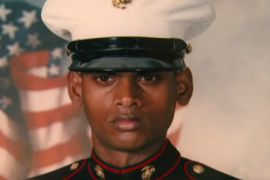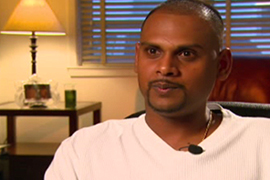US immigrant veterans’ new battle
Soldiers who fought in Iraq face massive delays to get US citizenship.

 |
| The US currently has almost 160,000 troops serving in Iraq [EPA] |
Waiting years to get US citizenship can be frustrating, especially if you have been risking your life for the country in Iraq.
In 2002, before the US invasion of Iraq, George Bush, the US president, promised to fast-track naturalisation applications for immigrants who serve in the military.
But despite that promise, security measures introduced since the attacks of September 11, 2001, and bureaucratic mix-ups are delaying service members from receiving their citizenship.
Abdool Habibullah filed his application in September 2005, after returning from a tour of duty in Iraq. The 27-year-old immigrant from Guyana is still waiting.
“Why?” asks the former marine, who still has his military style haircut and pressed T-shirts.
“Why should someone who served in the military in a time of combat – put their life on the line – why should I have to wait for citizenship?”
The delays often have consequences.
Habibullah planned to go into law enforcement when he came back to the US, where he has lived since he was 10-years old, but you have to be a citizen to apply.
Disheartening situation
 |
| Matejqowsqi is still suffering from injuries sustained in Iraq |
Krzysztof Matejqowsqi is in a similar situation.
He needs money for college and he would like to apply for some high-paying federal jobs in the department for homeland security, where his background as an army infantryman is considered an asset.
The 22-year-old Polish immigrant, who came to the US with his family when he was eight, filed his application before deploying to Iraq in 2006.
When he returned 15 months later, he discovered his papers had been lost.
He has had to file them all over again.
Matejqowsqi is still suffering from injuries sustained in an attack and finds his situation disheartening.
“I put my life on the line. We spent 15 months in combat in Iraq, I got injured, got a Purple Heart then to come back and find out somebody in the states didn’t do their job,” he says.
Slow process
| In Focus |
|
|
About 37,000 immigrants have received citizenship after serving in the military since the September 11 attacks.
According to the United States Citizenship and Immigration Services (USCIS), about 7,300 currently have applications pending.
It typically takes seven to 10 months to process a military application, according to USCIS spokesperson Chris Rhatigan, but she acknowledges there are about 140 service members who have been waiting more than two years.
“All the members of the military go to the front of the line, in fact there is no line for members of the military who want to naturalise and become US citizens,” Rhatigan said.
“There are rare exceptions where some individuals, through extraordinary circumstances, do not go through the process as quickly as we would like.”
FBI ‘overwhelmed’
|
We should be bending over backwards to get the obstacles out of our way for what they are doing for us |
Part of the problem, according to USCIS, is the logistics of tracking down people in the military who are moving from post to post, sometimes around the world in places that are hard to reach.
Another stumbling block is security clearances, particularly one referred to as a “name check”, where the FBI checks an applicant’s involvement in any crimes.
Bill Carter, an FBI spokesman, says a match does not necessarily mean the person is guilty of a crime. It may be, for example, that he or she was a witness to a crime.
That is where Habibullah’s application stalled and David Piver, a Philadelphia-based immigration lawyer, says that is also what held up the applications of the six service members who have come to him for help in recent years.
The FBI handles about 80,000 checks a week and Piver says the organisation is “overwhelmed”.
“We should be bending over backwards to get the obstacles out of our way for what they are doing for us,” he said.
Foreign names can also run into problems, Carter said, because they can be spelled different ways. For example, “Lopez” could also be spelled “Lopes” while Mohammed could be “Muhammed”.
‘No excuse’
 |
| Habibullah says there is no reason for his application to be delayed |
Carter said he appreciates the hardships experienced by waiting service members and the FBI is doing its best to clear the backlog, without compromising security.
It is building a new facility and hiring staff in an attempt to address the issues, he says.
“Our priority remains national security, to protect the United States from a terrorist attack. To that end, we must maintain a proper balance between security and efficiency.”
But Habibullah, who worked on military aircraft as a mechanic in the Marines, says that does not excuse the delays.
He now works as a helicopter mechanic for a private company.
“No excuse. I don’t accept apologies or excuses, there’s a problem here and it needs to be fixed, that’s the bottom line.”
